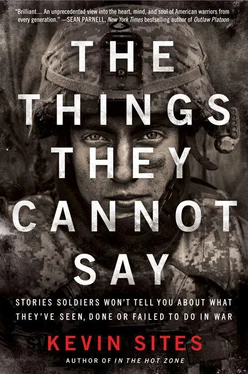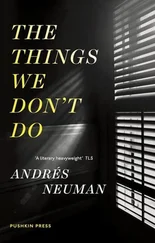But after Sperry was admitted to Balboa naval hospital in San Diego, he discovered that he might have lost more than his friends. When his wife, Cathy, first came to see him in his hospital ward, after months of painful separation, something strange happened. For Sperry there was no overwhelming sense of relief to see her again, no joyful reunion. In fact, no feelings at all. Sperry says it was as if he were just seeing any other friend for a night of pizza or bowling. I look at Cathy’s face while he says this, but there’s no expression. In the time since, perhaps she’s come to feel the same about him. I look at them both and wonder if Sperry’s head injury has also impacted his capacity to feel.
Sperry and Cathy spent the next two years at Pendleton on a seesaw teetering between hope and despair. Too often, despair seemed to have the greater mass. While Cathy would go to work on base, Sperry spent his days, by his own admission, drinking with another wounded Marine from his unit from sunup to sundown or whenever they passed out.
“We went about our separate ways,” says Cathy of those times. “He would go with Phil drinking day and night. It was a losing battle for me so I just gave in to him.” And while Cathy gave in to him, Sperry gave in to a recklessness that defied his own mortality, manifesting itself in a series of “crotch rocket” high-performance motorcycles.
Sperry, wasted on tequila sunrises, would take his bikes out riding around, popping wheelies at seventy miles per hour. On one occasion, he says he took his Italian Aprilia out on the freeway and pushed it to a hundred and sixty miles per hour while completely drunk. He took a deep breath afterward and realized exactly how close he had come to crossing that line between obliviousness and oblivion. He sold the bike two weeks later to keep himself from doing it again. The sale, however, did not stop his drinking.
“I didn’t cry for two years,” Sperry says. “I drank all my sorrows away.” Or he tried to. It became a choice between the pain, the splitting migraines from the physical and emotional trauma of his combat experiences, and the puking and massive hangovers from his daily drinking. The strains on his marriage were becoming intractable.
“It was kind of a blur,” Cathy says of the time. “I was so young, I didn’t know how to help him.”
“I wanted her to understand what I was going through.” Sperry says, nodding, as we continue talking around the table. “She couldn’t see it.”
The strain did not prevent Cathy from becoming pregnant and on July 12, 2006, their daughter, Hannah, was born. Sperry named her after his best friend killed in Iraq, Fernando Hannon. Although Hannah’s birth provided some sense of hope for him, it was not enough to lift the darkness that surrounded him. The gravity of the deaths of nearly two dozen of his Marine friends in Iraq was crushing him. He saw their faces every day, remembered how they messed with each other but how when it came down to the fighting, they always had each other’s backs. The band-of-brothers cliché was true, he knew it, but what was also true was that in combat you had so little control. No matter how hard you look, how do you see a roadside bomb before it blows? How do you stop a sniper’s bullet before it hits? Even as your brothers watch out for you and you watch out for them, these things are beyond your control, especially when you’re fighting phantoms like the insurgents who rarely show themselves in Iraq. While he drank to forget, the booze wasn’t enough. It couldn’t dull, let alone blot out, the physical and emotional pain he endured every day, the migraines, the backaches, the insomnia. On September 6, 2006, nearly two years after he was wounded in Fallujah, it all became too much.
“I remember it started out normal,” says Sperry. “I’m not sure what triggered it, but I think I had a flashback. I was thinking how I lost so many friends and was missing them so much.” And the alcohol only made things worse. That morning, in the garage of his house on base, Sperry threw a rope over the end of one of the support beams just as a gunnery sergeant neighbor, also back from Iraq, had done down the street only a few weeks earlier. At that moment nothing good was getting through a brain damaged by shrapnel, muddled by alcohol and wracked by survivor’s guilt. Sperry doesn’t know how long he stood there wondering if making the noose would be his point of no return. Is this how he wanted to go out? Dangling at the end of a rope in his garage where his wife would find him and never be able to erase the image from her mind? Sperry stopped. He yanked the rope back down, got into his car and drove to the VA (Veterans Affairs) outreach center on the base. When he arrived, he says, there were three men ahead of him. He sat in his car in the parking lot, staring ahead and blasting the stereo until someone came out to talk with him.
They said he “sounded like a robot,” Sperry says, when he answered questions from the counselor who came out to check on him. The counselor realized Sperry was suicidal. He called a police escort and Sperry was taken to the VA’s mental health facility in San Diego. He spent the next few hours in a padded room talking to a psychiatrist, who decided to commit him for his own safety. They stripped him of all his clothes and belongings, anything with which he could hurt himself, and moved him into the facility for the next two weeks.
While Sperry pulled himself back from the brink, hundreds of others who served in the wars in Iraq and Afghanistan did not. In fact, U.S. Department of Veterans Affairs secretary Eric Shinseki announced that out of the thirty thousand suicides in America each year, a full 20 percent are committed by veterans. The Department of Defense’s Suicide Event Report, a compilation of suicide information and analysis across all branches of the military, notes that eleven hundred service members killed themselves in the four years from 2005–2009, or one suicide every thirty-six hours.
During my research, psychiatrist Dr. Jonathan Shay told me that suicide was a commonplace thought amongst the mostly Vietnam-era veterans he worked with as staff psychiatrist in the VA outpatient clinic in Boston. “Almost everyone thinks daily of suicide,” he said. “It seems to sustain them as a bottom line of human freedom and dignity. Having touched that talisman every day, they continue to struggle.”
But during his time in the VA mental health facility in San Diego two things happened for Sperry: first, he had some time to detox from all the alcohol he had been drowning himself in for the last two years, and second, he was exposed to Vietnam War veterans who provided both positive and negative reinforcements toward reshaping his life. He could see within the VA hospital how self-medicating, mostly with alcohol, had utterly destroyed so many of these men. The memories of their war had ravaged them so completely that they spent the rest of their days toasting to their own demise. They were little more than carcasses now, men who most likely would’ve preferred to die during their deployments, rather than the slow postwar attrition that killed them from the inside out. The Vietnam vets who had kicked the booze told him as much, that being sober was the only way he was likely to survive.
He could see their point and realized that at the very least, he had to cut back on the drinking or he could really end up swinging from the roof beam of his own garage. But giving up drinking without something to replace it wasn’t an option Sperry was ready to try. So the memories that he had once tried to wash away he was now determined to blow up in smoke.
But he also knew he needed to make other changes. Camp Pendleton had become a neighborhood of bad influences, where other damaged Marines, returning from Iraq and Afghanistan, pursued self-destructive trajectories. Sperry had to break away from that to truly heal. Home sounded safe, and being in a safe place was becoming critically important to him. In October 2007, Sperry, Cathy and Hannah moved back to his father’s house in Illinois. They stayed for six months and things seemed to improve. In April 2008 they rented their own home, and that’s where things turned dark again. That sense of safety, of being around family, someone watching your back, evaporated in their new surroundings. Sperry never slept. His nights and days began to blend together, punctuated only by the anger and restlessness that had him punching holes in the walls. Despite the fragile physical condition of his skull, where any kind of blow had the potential to cause permanent brain damage or kill him, Sperry found his anger spilling over to human targets. A small provocation led him to pounce on a young man in the parking lot of a Walmart.
Читать дальше












